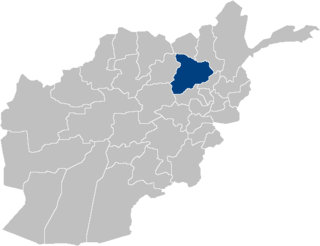
Mazar-i-Sharīf, also known as Mazar-e Sharīf or simply Mazar, is the fourth-largest city in Afghanistan by population, with an estimated 500,207 residents in 2021. It is the capital of Balkh province and is linked by highways with Kunduz in the east, Kabul in the southeast, Herat in the southwest and Termez, Uzbekistan in the north. It is about 55 km (34 mi) from the Uzbek border. The city is also a tourist attraction because of its famous shrines as well as the Islamic and Hellenistic archeological sites. The ancient city of Balkh is also nearby.

The Taliban insurgency began after the group's fall from power during the 2001 War in Afghanistan. The Taliban forces fought against the Afghan government, led by President Hamid Karzai, and later by President Ashraf Ghani, and against a US-led coalition of forces that has included all members of NATO; the 2021 Taliban offensive resulted in the collapse of the government of Ashraf Ghani. The private sector in Pakistan extends financial aid to the Taliban, contributing to their financial sustenance.

The fall of Mazar-i-Sharif in November 2001 resulted from the first major offensive of the Afghanistan War after American intervention. A push into the city of Mazar-i-Sharif in Balkh Province by the United Islamic Front for the Salvation of Afghanistan, combined with U.S. Army Special Forces aerial bombardment, resulted in the withdrawal of Taliban forces who had held the city since 1998. After the fall of outlying villages, and an intensive bombardment, the Taliban and al-Qaeda forces withdrew from the city. Several hundred pro-Taliban fighters were killed. Approximately 500 were captured, and approximately 1,000 reportedly defected. The capture of Mazar-i-Sharif was the first major defeat for the Taliban.

The 2007 Baghlan sugar factory bombing occurred on November 6, 2007, when a bomb exploded in the centre of Baghlan, Afghanistan, while a delegation of parliamentarians was visiting, killing at least 72 people including several lawmakers.
On 8 August 1998, amidst the Battles of Mazar-i-Sharif, the Iranian consulate in Mazar-i-Sharif was attacked as the Taliban were besieging the city. Initially, only the deaths of eight Iranian diplomats was reported, but two other diplomats and a journalist were later confirmed dead as well, bringing the total casualty rate to 11 personnel. The executions of the diplomats are speculated to have been carried out by Sipah-e-Sahaba Pakistan. During this time, Iran was supporting the anti-Taliban Northern Alliance, and the killings heightened direct military tensions along the Afghanistan–Iran border, which was controlled on the Afghan side by the Taliban's Islamic Emirate at the time.
The Battles of Mazar-i-Sharif were a part of the Afghan Civil War and took place in 1997 and 1998 between the forces of Abdul Malik Pahlawan and his Hazara allies, Junbish-e Milli-yi Islami-yi Afghanistan, and the Taliban.
Events from the year 2011 in Afghanistan.
These are the list of Terrorist attacks in Pakistan in 2010.

The Hazaras have long been the subjects of persecution in Afghanistan. The Hazaras are mostly from Afghanistan, primarily from the central regions of Afghanistan, known as Hazarajat. Significant communities of Hazara people also live in Quetta, Pakistan and in Mashad, Iran, as part of the Hazara and Afghan diasporas.

The 2011 Afghanistan Ashura bombings were a pair of bombings in the Afghan capital of Kabul and Mazar-e-Sharif. The Kabul suicide bombing took place at around noon local time, on the day when Muslims commemorate Ashura, an annual holy day throughout the Muslim world particularly by the Shi'a Muslims.
The following lists events from 2014 in Afghanistan.
The following lists events that happened in 2013 in Afghanistan.
The following lists events that happened during 2016 in Afghanistan.
Shia Muslims have been persecuted by the Islamic State, an Islamic extremist group, since 2014. Persecutions have taken place in Iraq, Syria, and other parts of the world.

The 2016 Bagram bombing took place on November 12, 2016, when a suicide bomber managed to penetrate the security layer of Bagram Airfield, the largest U.S. military base in Afghanistan located about 45 km north of Kabul, detonating his vest near a group of soldiers who were en route to Modern Army Combatives Training. Four U.S. citizens were killed (2 soldiers and 2 contractors, while at least 17 others were injured, including 16 Americans and 1 Polish citizen. One injured soldier died a month later from complications due to injuries sustained in the blast raising the total killed to 5.
Events in the year 2017 in Afghanistan.

The Islamic State–Taliban conflict is an ongoing armed conflict between the Islamic State Khorasan Province (IS-KP) and the Taliban regime in Afghanistan. The conflict initially began when both operated as insurgent groups in Nangarhar; since the creation of the Taliban's emirate in 2021, IS-KP have targeted and assassinated Taliban members using hit-and-run tactics. The group have also caused incidents and attacks across the border in Pakistan.
2021 (MMXXI) was a common year starting on Friday of the Gregorian calendar, the 2021st year of the Common Era (CE) and Anno Domini (AD) designations, the 21st year of the 3rd millennium and the 21st century, and the 2nd year of the 2020s decade.







